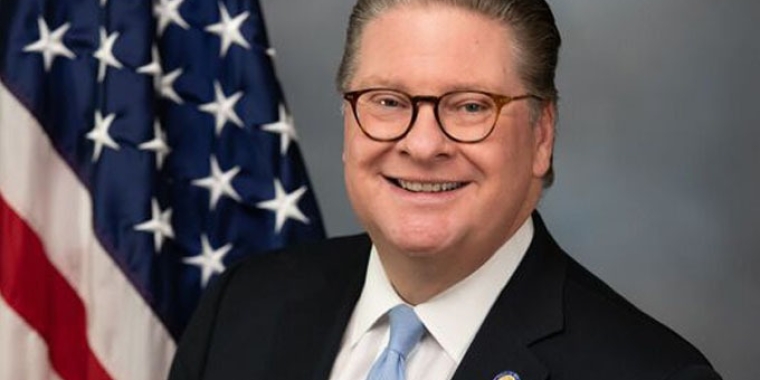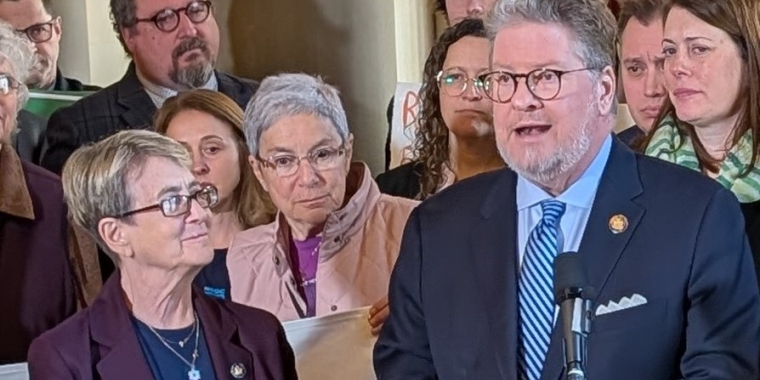
Harckham Introduces Zero Emission Lawn and Landscape Equipment Legislation
October 27, 2021
-
ISSUE:
- Zero emission lawn care
- Climate Change
- Environmental Protections
- Pollution
- Senator Harckham. SD40

Peekskill, NY – New York State Senator Pete Harckham introduced new legislation recently that requires all in-state sales of new lawn care and landscaping equipment, such as mowers, leaf blowers and trimmers, be zero emissions by 2027.
“As New York continues to advance the goals set in the Climate Leadership and Community Protection Act, we need to do more to reduce our dependence on fossil fuels,” said Harckham. “Gas-powered landscaping devices create an inordinate amount of air pollutants, and so it is imperative that we transition to zero emission equipment.”
Added Harckham, “The environmental benefits of zero emission lawn devices are many, and as more communities in New York look to ban or partially ban gas-powered devices, the switch to electric equipment, which is certainly quieter to operate, will take place quickly statewide.”
Harckham’s new bill (S.7462) will amend the state’s energy law to require zero emission “lawn care devices” by 2027, which will include any device powered mechanically and intended to be used or actually used for “the mowing of grass, the cutting or chopping of trees, tree roots, or tree branches, or the clearing of leaves or other vegetation from lawns, sidewalks, public streets or public highways and shall include, but not be limited to, such devices as lawn mowers and lawn mower attachments, lawn edgers, leaf blowers, leaf vacuums, mulchers, and chippers.”
This bill notes that all lawn care devices that are offered for sale or sold in the state will be zero-emissions by 2027 which will be done with safety, technological feasibility, and cost- effectiveness in mind. With assistance from various state agencies, a plan will be put in place to ensure that a transition strategy is developed by February 2023. The agencies will overview the issue of new equipment affordability as well to ensure that these zero-emission lawn care devices are affordable so individuals in low-income and disadvantaged communities have the access to such devices.
Prior to submitting the legislation, which was filed with the Senate Rules Committee last week, Harckham met with professional landscapers, who voiced concerns about recouping investments on recently purchased equipment. The five-year implementation to zero emissions in the bill takes this into consideration.
Earlier this month, California Governor Gavin Newsom signed a bill banning gas-powered lawn equipment and generators starting in 2024. The state has three million more small, 2-cycle engine pieces of lawn equipment in use right now than light-duty passenger cars on the road. A California Air Resources Board study noted that a best-selling gas-powered leaf blower emits as much pollution in an hour of use as a 2016 Toyota Camry does driving for 1,100 miles.
According to a report from the U.S. Environmental Protection Agency, 54 million Americans mow their lawns (or have them mowed) each year, using 800 million gallons of gasoline. A new gas-powered mower produces in one hour as much greenhouse gases as 11 new cars being driven in an hour. Garden equipment engine emissions have been unregulated since the 1990s.
“Gas-powered, non-road equipment pollutes heavily and, when combined with the poor air quality present in many of our urban and suburban communities, presents a clear harm to the health and well-being of the residents of New York State,” said Mark F. Thielking, director of Energy and Sustainability for the Town of Bedford. “Electric-powered equipment, on the other hand, produces no emissions at the point of use, and is much more efficient, with performance that has improved significantly over the last decade to allow it to be a very good alternative.”



